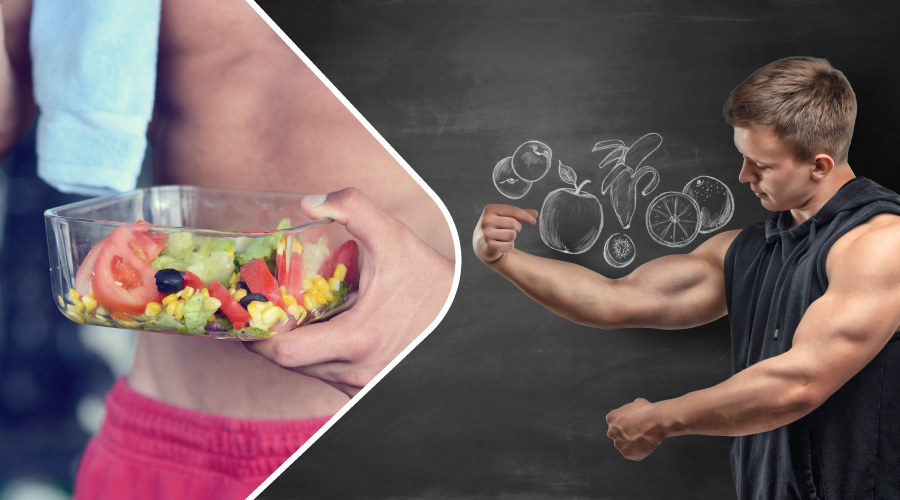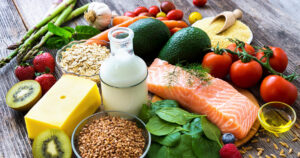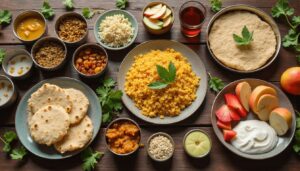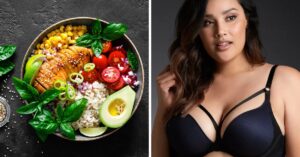Let's be honest building serious muscle on a vegetarian diet used to seem impossible. You might have faced doubts from friends or even questioned yourself. We've been taught that animal protein is key for muscle growth. But, what if we told you that plant-based muscle building is not only possible but also very effective?
Many of us choose a vegetarian lifestyle for health, ethics, and environmental reasons. If you're like us, figuring out how this choice fits with your fitness goals can be tough. The bad news is outdated the idea that meat equals muscle is no longer true.
In this guide, we'll dive into the world of vegetarian muscle gain. We'll show you how to create a diet that uses plant-based proteins to build muscle. By the end, you'll not only clear up these myths but also be eager to start a vegetarian diet for your muscle-building journey.
Let's explore the amazing benefits waiting for you and help you become stronger and better.
How to Build Muscle on a Vegetarian Diet
Building muscle means making your muscles bigger and stronger. This happens through the right training and diet. If you're into plant-based workouts, knowing how muscles grow and what nutrients they need is key.
The Science Behind Muscle Growth
Muscle growth happens when muscles get a bit damaged from working out. This damage makes the muscles repair and grow, making them stronger. This repair process needs protein and time to rest between workouts.
Key Nutrients for Muscle Development
To grow muscles well, you need a diet full of essential amino acids. These amino acids are found in protein-rich foods and are the building blocks of muscle. Other nutrients like vitamins, minerals, and healthy fats are also important. For plant-based diets, getting these nutrients from foods like legumes, nuts, seeds, and whole grains is essential.
| Nutrient | Function | Plant-Based Sources |
|---|---|---|
| Protein | Muscle repair and growth | Legumes, tofu, quinoa |
| Essential Amino Acids | Protein synthesis | Chia seeds, hemp seeds, soy products |
| Iron | Oxygen transport to muscles | Spinach, lentils, chickpeas |
| Omega-3 Fatty Acids | Anti-inflammatory properties | Flaxseeds, walnuts, algae oil |
Importance of Consistent Training
Regular strength training is essential for muscle growth. It not only builds muscle but also helps with recovery. This cycle of stress and recovery leads to bigger and stronger muscles over time. For those on a plant-based diet, sticking to a workout routine and eating right can lead to great muscle gains.
Nutritional Requirements for Vegetarians
Vegetarian nutrition is key for good health. For muscle building, a balanced diet with essential nutrients is needed. We must eat a variety of nutrient-rich foods.
Iron is vital for vegetarians. Iron from plants is harder for our bodies to absorb than animal iron. To help absorb iron, eat iron-rich foods like lentils and spinach with vitamin C foods like bell peppers.
Vitamin B12 is another important nutrient. It's mainly found in animal products. Vegetarians need supplements or fortified foods like plant-based milk and cereals to get enough.
Don't forget about omega-3 fatty acids for heart and brain health. Vegans and vegetarians can get these from flaxseeds, chia seeds, and walnuts. Adding these to our diet supports our overall health.
Dietary balance is also key. Good meal planning for vegetarians means eating a variety of foods. This keeps our energy up and helps our muscles recover.
| Micronutrient | Sources | Benefits |
|---|---|---|
| Iron | Spinach, lentils, quinoa | Red blood cell production and oxygen transport |
| Vitamin B12 | Fortified plant-based milk, cereals, nutritional yeast | Nervous system health and DNA production |
| Omega-3 Fatty Acids | Flaxseeds, chia seeds, walnuts | Heart and brain health |
Creating a balanced vegetarian diet is about careful meal planning. It ensures we get all the nutrients we need from plant-based foods. This helps us reach our fitness goals and stay healthy.
Choosing the Right Plant-Based Proteins
Building muscle on a vegetarian diet is totally possible with the right proteins. We'll explore top vegan protein sources. We'll also talk about complete proteins and protein combining to help you grow muscle.
Top Plant-Based Protein Sources
Choosing a variety of vegan proteins is essential. Here are some top picks for your diet:
- Quinoa: This versatile grain is rich in protein and has all essential amino acids. It's great for any meal.
- Lentils: Lentils are high in protein and fiber. They help with digestion and keep you full.
- Tempeh: Made from fermented soybeans, tempeh is full of protein and probiotics. It's good for your gut.
- Chickpeas: Chickpeas are perfect for soups, stews, and salads. They're a good source of plant proteins and vitamins.
Complete Proteins and Protein Combining
Complete proteins have all nine essential amino acids our bodies can't make. Animal sources usually have them, but some plants like quinoa and soybeans do too.
But, many plant proteins lack some amino acids. That's where protein combining comes in. Mixing different plant proteins gives you all the amino acids you need.
Here are some good combinations:
- Rice and Beans: This combo has a balanced amino acid profile.
- Whole Grain Bread and Peanut Butter: It's tasty and nutritionally complete together.
- Hummus and Whole Wheat Pita: A Middle Eastern favorite that offers complementary amino acids.
By eating a variety of these vegan proteins, we can meet our protein needs for muscle building. We don't need animal products to do it.
Building Balanced Vegetarian Meals
To build balanced vegetarian meals for muscle growth, we need to focus on the right mix of nutrients. Our diet should have the correct amounts of proteins, carbs, and fats. This is key to reaching our fitness goals.
Macronutrient Ratios
The best ratios for muscle building in a vegetarian diet are:
- Protein: 20-30% of total daily calories, from sources like legumes, tofu, and quinoa.
- Carbohydrates: 50-60%, focusing on whole grains, fruits, and veggies.
- Fats: 20-30%, with healthy fats from nuts, seeds, and avocados.
By planning our meals with these ratios in mind, we can get the nutrients needed for muscle growth and health.
Importance of Healthy Fats and Carbohydrates
In a vegetarian diet, not all fats and carbs are the same. It's important to choose healthy ones for the best balance.
Healthy fats, like those in olive oil, nuts, and seeds, help with hormone production and cell health. They should be a key part of our meals. Carbs from complex sources like brown rice, oatmeal, and sweet potatoes give us energy for workouts and help us recover.
Here are some examples of balanced vegetarian meals that follow these guidelines:
| Meal | Protein Source | Carbohydrate Source | Fat Source |
|---|---|---|---|
| Breakfast | Greek Yogurt | Berries and Oats | Chia Seeds |
| Lunch | Lentil Soup | Whole-Grain Bread | Avocado |
| Dinner | Tofu Stir-fry | Brown Rice | Cashew Nuts |
| Snack | Hummus | Carrot Sticks | Olive Oil (in hummus) |
By following this structured approach to macronutrient balance, we can create a vegetarian diet that supports muscle growth well and sustainably.
Sample Meal Plans for Muscle Gain
To gain muscle on a vegetarian diet, you need to plan well. This includes getting enough protein and balanced nutrition. We have vegetarian meal plans for beginners and advanced individuals. We also have high-protein snacks and quick meals for all day energy.
Meal Plan for Beginners
This meal plan is simple and easy to make. It helps you get the nutrients you need for muscle gain without spending too much time cooking.
- Breakfast: Greek yogurt with honey, fresh berries, and a handful of almonds.
- Mid-Morning Snack: A banana and a handful of mixed nuts.
- Lunch: Quinoa salad with chickpeas, kale, avocado, and a tahini dressing.
- Afternoon Snack: Hummus with carrot and celery sticks.
- Dinner: Stir-fried tofu with mixed vegetables and brown rice.
- Evening Snack: A smoothie made with almond milk, spinach, banana, and plant-based protein powder.
Advanced Meal Plan
If you're more into cooking, this meal plan offers more variety and complexity. It's designed to help you gain muscle effectively.
- Breakfast: Chia seed pudding with coconut milk, topped with mixed berries and hemp seeds.
- Mid-Morning Snack: Cottage cheese with pineapple chunks.
- Lunch: Lentil and sweet potato curry with steamed broccoli.
- Afternoon Snack: Edamame sprinkled with sea salt.
- Dinner: Grilled tempeh with quinoa, roasted Brussels sprouts, and lemon-tahini sauce.
- Evening Snack: A mix of nuts and dried fruits like apricots and raisins.
Snacks and Quick Meals
High-protein snacks are key for energy and muscle growth. Here are some quick and easy options:
- Protein bars with nuts and seeds.
- Smoothies with fruits, greens, and plant-based protein powders.
- Roasted chickpeas with your favorite spices.
- Almond butter on whole-grain toast.
- Hard-boiled eggs (for lacto-vegetarians).
- Greek yogurt parfait with granola and fresh fruit.
Adding these vegetarian meal plans to your diet will help you get enough protein and nutrients. High-protein snacks will keep you energized for workouts.
Supplements to Consider on a Vegetarian Diet
Building muscle on a vegetarian diet can be tough but doable with the right supplements. Key vegetarian supplements help boost muscle growth and meet nutritional needs. Let's look at some important supplements for muscle-building.
Protein Powders
Plant-based protein powder is a top vegetarian supplement. It's great for boosting protein intake without animal products. Pea, hemp, and brown rice proteins offer the amino acids needed for muscle repair and growth. Using plant-based protein powder is key after workouts to help muscles recover fast.
Also Read: Circulation-Boosting Foods
Creatine
Creatine monohydrate is essential for vegetarians wanting to build muscle. It's found in meat and fish and boosts energy during intense workouts. Adding creatine to your routine helps ensure muscle energy and growth for vegetarians.
BCAAs
Branched-chain amino acids (BCAAs) are vital for muscle growth and recovery. Even with a balanced diet, supplements ensure you get enough BCAAs, which are critical after hard workouts. Adding BCAAs to your supplements can be a big help for vegetarians.
| Supplement | Primary Benefit | Source |
|---|---|---|
| Plant-Based Protein Powder | Muscle Repair and Growth | Pea, Hemp, Brown Rice |
| Creatine Monohydrate | Enhanced Performance and Strength | Naturally in Meat and Fish |
| BCAAs | Muscle Protein Synthesis | Diet and Supplements |
Managing Caloric Intake and Surplus
Knowing how to manage calories is key for building muscle, even on a vegetarian diet. We need to eat enough calories to grow muscles but not too many to gain fat. Here's how to do it right.
Calorie tracking is vital to make sure we're eating more than we burn. First, we calculate our Total Daily Energy Expenditure (TDEE). This includes our basal metabolic rate (BMR), how active we are, and our lifestyle. With our TDEE figured out, we add extra calories for muscle gain.
Keeping the right energy balance is essential. Eating too much can lead to fat gain, while not enough won't help muscles grow. Here's a simple table to show how extra calories help build muscle:
| Caloric Surplus Range | Expected Outcome | Considerations |
|---|---|---|
| 200-500 kcal/day | Steady muscle gain with minimal fat increase | Ideal for gradual growth, optimal for most individuals |
| 500-1000 kcal/day | Faster muscle gain, possible higher fat gain | Best for hardgainers or those with high activity levels |
| 1000+ kcal/day | Rapid muscle gain, significant fat increase expected | Recommended only for short bulking phases |
Everyone needs a personalized plan. Watching how our body changes and adjusting our diet helps keep the right energy balance. Using apps to track calories can make it easier to stay on track and ensure we're getting enough extra calories for muscle gain.
Common Mistakes to Avoid
When you're on a vegetarian diet for muscle building, some common mistakes can slow you down. One big issue is not getting enough protein. Plant-based foods often have less protein than animal products. This can make it hard to build and repair muscles.
Another mistake is not getting all the nutrients you need. While focusing on protein, it's easy to forget about vitamins B12, D, iron, and omega-3 fatty acids. These are key for health and muscle function. Make sure to eat a variety of foods or take supplements to get these nutrients.
Also, you need to eat more calories than you burn to gain muscle. Plant-based foods are often low in calories but high in fiber. To fix this, add foods like nuts, seeds, and avocados to your diet.
To avoid these mistakes, choose foods that are both protein-rich and calorie-dense.
Here's a table to help you plan your meals:
| Food | Protein (g per serving) | Calories per serving | Key Nutrients |
|---|---|---|---|
| Quinoa | 8 | 222 | Magnesium, Iron, Zinc |
| Chickpeas | 14.5 | 269 | Folate, Fiber, Iron |
| Lentils | 18 | 230 | Folate, Fiber, Magnesium |
| Almonds | 6 | 164 | Vitamin E, Magnesium, Fiber |
| Chia Seeds | 4.7 | 137 | Omega-3, Fiber, Calcium |
| Spinach | 5 | 41 | Iron, Calcium, Vitamin C |
By planning your vegetarian diet carefully, you can support muscle growth well.
Vegetarian Diet To Build Muscle: Exercise Recommendations
Combining a vegetarian diet with the right exercise is key for muscle gain and fitness. We'll cover the basics of strength training and how to mix in cardio. This ensures a balanced exercise regimen.
Strength Training Essentials
Strength training is essential for vegetarians looking to build muscle. A consistent resistance training for vegetarians plan is needed. It should target major muscle groups at least twice a week.
Focus on big movements like squats, deadlifts, and bench presses. These exercises help grow muscles. Free weights, machines, and bodyweight exercises offer variety and adjustability.
Incorporating Cardio
Strength training is the base, but cardio is important too. It boosts heart health, helps with recovery, and prevents fat gain. For a balanced exercise regimen, do moderate-intensity cardio like jogging or cycling.
Also, try high-intensity interval training (HIIT) for effective, short workouts.
| Exercise Type | Recommended Frequency | Examples |
|---|---|---|
| Strength Training | 2-4 times per week | Squats, Deadlifts, Bench Presses, Rows |
| Moderate-Intensity Cardio | 3-5 times per week | Jogging, Cycling, Swimming |
| High-Intensity Interval Training (HIIT) | 1-2 times per week | Sprints, Circuit Training |
By following these steps, we can build muscle on a vegetarian diet. We also keep our health and fitness in check.
Tracking Progress and Adjusting Diet
Keeping an eye on your progress is key to reaching your fitness goals. Starting a vegetarian diet for muscle building needs a good plan for tracking progress. This helps us see if our diet and workouts are working.
Keeping a workout journal is a simple way to track progress. Write down your sets, reps, and weights for each workout. This shows your strength gains and where you need to improve. It's also vital to keep track of what you eat every day. Use apps or journals to log your daily food and calories to support muscle growth.
Regular body measurements are another important part of tracking progress. Take measurements of your biceps, chest, waist, and thighs every few weeks. These measurements show the changes in your body. Taking progress photos at the same time each month also helps see how your body is changing.
When you see your progress slow down, it's time to make some changes. You might need to adjust your diet or eat a bit more. Remember, getting fit is a long journey. Small changes in your diet can help you grow muscle over time.
Here's a more detailed breakdown for effective progress tracking and making dietary adjustments:
| Progress Tracking Method | Frequency |
|---|---|
| Workout Journal | Daily |
| Macronutrient and Caloric Logging | Daily |
| Body Measurements | Bi-weekly |
| Progress Photos | Monthly |
Success Stories and Case Studies
We explore the real-life stories of vegetarian bodybuilders and plant-based athletes. They share their experiences to inspire and offer insights into building muscle on a vegetarian diet. Robert Cheeke, a well-known vegan bodybuilder, shows it's possible to gain muscle on plants. He emphasizes the need for varied protein, regular workouts, and supplements.
Torre Washington, a vegan bodybuilder for over 20 years, also stands out. He credits his diet rich in legumes, grains, veggies, and protein powders for his success. His story proves the importance of balanced nutrition for top performance.
Jehina Malik, a female bodybuilder, has been a vegetarian her whole life and vegan for over a decade. Her journey shows how a good diet and training can lead to amazing muscle growth. Her success proves that a plant-based diet doesn't limit athletic goals.
These stories show different ways vegetarian bodybuilders reach their fitness goals. Learning from them helps us see the power of plant-based diets in building muscle.
FAQ
What is muscle hypertrophy?
Muscle hypertrophy is when your muscles get bigger and stronger from regular workouts. It happens when your muscles grow and repair themselves. This is key to building muscle mass.
Can I build muscle on a vegetarian diet?
Absolutely! You can definitely build muscle on a vegetarian diet. With the right food and regular workouts, you can see big gains.
What are some key nutrients for muscle development on a vegetarian diet?
For muscle growth, you need protein, amino acids, vitamins, and minerals like iron and B12. Eating a variety of plants helps meet these needs.
Which plant-based protein sources are best for muscle gain?
Great protein sources include lentils, quinoa, tempeh, chickpeas, and tofu. These foods are full of protein that helps your muscles grow and recover.
How do I ensure I’m getting complete proteins on a vegetarian diet?
Mix different plant proteins to get all essential amino acids. For example, eat rice with beans or hummus with whole grain pita.
What is the ideal macronutrient ratio for building muscle on a vegetarian diet?
Aim for about 40% protein, 40% carbs, and 20% fats. This mix helps your muscles grow and gives you energy.
Are there any plant-based protein powders suitable for vegetarians?
Yes, there are many vegetarian protein powders. Look for ones made from pea, rice, hemp, or soy proteins. They can boost your protein intake.
Should vegetarians consider taking creatine supplements?
Creatine is good for vegetarians too. It's mainly found in animal products but helps with muscle growth and performance in intense workouts.
How important is it to manage caloric intake for muscle gain?
It's very important to manage calories for muscle gain. You need to eat more calories than you burn to grow muscle without gaining too much fat.
What are common mistakes to avoid on a vegetarian muscle-building diet?
Don't forget to eat enough protein and don't neglect a caloric surplus. Also, make sure you get enough iron and B12. A balanced diet is key.
How can I integrate cardio into my muscle-building routine?
Adding cardio is good for your heart and overall fitness. Choose moderate-intensity cardio that doesn't hurt your muscle-building efforts.
How can I track my progress and adjust my diet and training?
Keep track of your muscle growth, body composition, and diet. Use this info to tweak your diet and workouts to meet your fitness goals.
Are there any success stories of vegetarian bodybuilders?
Yes, many vegetarian athletes and bodybuilders have built impressive muscle. Their stories can motivate you and show you effective ways to eat and train.






